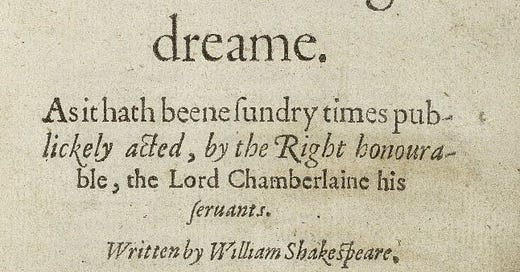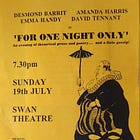David Tennant: His History with "A Midsummer Night's Dream"
...he's never done the play before. Or has he?

Over the course of his lengthy and storied career, David Tennant has flirted long and hard with William Shakespeare’s iconic play, A Midsummer Night’s Dream. And although David’s technically never been in a full-length official run-style production of the play, he’s certainly danced around its periphery often enough.
In today’s post, we’ll be taking a closer, chronological look at a few of the times he did.
-
It’s 1990. David is a drama student attending the Royal Scottish Academy of Music and Drama (the RSAMD, now the Royal Conservatoire of Scotland). As far as I’m aware, it’s at this point in his life where David first got involved with A Midsummer Night’s Dream in a drama capacity.
David was one of five students selected to participate in an international conference and festival of drama training hosted in Palermo, Italy, on 20-22 September 1990. It was called the Teatro E Scuole Di Teatro Festival.
David and the other four students (one of whom was his classmate Vicki Masson) traveled to Palermo with the RSAMD’s Director of Drama, Edward Argent. During their stay, they presented a compilation of A Midsummer Night's Dream and The Tempest written and directed by Argent entitled My So Potent Art Shakespeare.
While I don’t know the entire cast list, I do know David played two roles: in A Midsummer Night's Dream he was Oberon, King of the Fairies, and in The Tempest he portrayed Prospero. Vicki Masson played Puck in A Midsummer Night's Dream, and Ariel in The Tempest.
And, as the quote "My so potent art" comes from Prospero's speech in Act V, Scene I of The Tempest, it was David who recited the programme’s title during the performance!
I’ve spoken about this particular conference before in the context of David In The Archives:
At the time I wrote the post above, I’d been pretty passionate about expressing my wish that I could read have someone translate for me a 25-page long volume stored in the Central Library of the Sicilian Region in Palermo, Italy. It’s about the Teatro E Scuole Di Teatro Festival. Furthermore, the dates of David’s 1990 festival are in its subtitle, so it’s my hope it’s about that festival in particular. ARGH. I still wish I could read it!
If wishes were horses, eh? Let’s move on.
—
Fast forward with me to Tuesday, 20 March 2001. David had just wrapped his first season as a member of the RSC (he’d finished his run as Romeo in Romeo and Juliet just twelve days previously).
On that Tuesday evening in March, after less than two weeks of rehearsal, he joined his fellow actors from the Royal Shakespeare Company onstage at the Barbican Hall to participate in a semi-staged reading of A Midsummer Night’s Dream for the City of London Sinfonia’s 30th Anniversary Gala.

Among the actors David joined onstage that night were a few he’d been working with in the months previously: Paul Greenwood and Ian Hughes from The Comedy Of Errors, and Emily Raymond from both The Comedy of Errors and The Rivals.
Also in the acting party was Desmond Barrit, who David had worked with in 1998’s The Real Inspector Hound/Black Comedy and For One Night Only. I’ve written in more detail about both of these productions, so if you’re interested in learning more about them, simply click below and then come on back!
The City of London Sinfonia is a chamber orchestra founded in 1971 by music director Richard Hickox. For its 30th Anniversary Gala, the Sinfonia wanted to continue a tradition they’d started a few years prior - staging a series of concerts to celebrate music written about Shakespeare’s A Midsummer Night’s Dream. To that end, the concert series’ creator Jonathan Best was appointed the anniversary gala’s director, and the Sinfonia’s founder and music director Richard Hickox would conduct the orchestra.
Best wanted to somehow integrate Shakespeare's text with the complete score (the Overture and incidental music) composer Felix Mendelssohn had written for A Midsummer Night’s Dream. During the development phase of the gala, Best found Mendelssohn’s little bits of fairy-like incidental music the most difficult to grapple with. He knew he wanted to work alongside the Royal Shakespeare Company for the play itself, but he also didn’t feel a simple stage reading of the play was a solution, either. Best also wasn’t sure how to effectively mesh the poetic verse with the music without the risk of losing one or the other to distractions.
In a CLS Memories post Best wrote in 2021, he explained how he decided upon a “semi-staged” performance:
The answer was suggested to me by a very experienced theatre director friend named Jon Tarlton; “You could do it as a Victorian after-dinner drawing-room entertainment,” he said. It all fitted together nicely – the actors could be a family and their friends who have eaten together and then convene to read the play, while they listen to a gramophone record of Mendelssohn’s music. The music itself connects the play to the Victorian era, and Victorian costumes would make visual sense of Mendelssohn and Shakespeare in partnership. My hope was that as the play unfolded and gathered pace, the actors would feel confident to abandon simply reading and break out into more fully-fledged acting performances, using items of furniture and bits and pieces in the room as improvised props.
The lovely thing about this idea was that the actors got to keep their scripts – just in case they needed them – but they could also fling them aside when they felt able and let the play itself rip. Audience and actors could meet each other properly, in a way that a formal ‘reading’ of a play just does not allow.
So, that night, David and the rest of the RSC actors - Samantha Bond (Titania/Hippolyta), Alex Jennings (Oberon), Ian Hughes (Puck), Desmond Barrit (Bottom), Mali Harries (Hermia), Emily Raymond (Helena), Adam Levy (Demetrius/Snug), Paul Greenwood (Peter Quince), and Robert Gillespie (Starveling) - stepped on stage in Victorian garb. The City of London Sinfonia Orchestra was set up on stage behind the actors.
David himself played the roles of Lysander and Flute. He also played another role he’s not credited with on any source I could find other than in one review - that of Thisbe. This is, of course, because Flute is forced to play the female role of Thisbe in Pyramus and Thisbe, the play-within-a-play Shakespeare designed to feature in A Midsummer Night’s Dream. So play Thisbe was precisely what David did.
Set in a late Victorian drawing room with easy chairs, cushions, and plants strewn about - and the orchestra tucked away at the back - we meet the cast as “guests” who gradually enter the drawing room after dinner one evening. Eventually, they begin to read the play out loud to one another.
To get an idea of what happens next, it’s best to turn to the review that does the deepest dive into the play’s staging - the one published in the 23 March 2001 edition of the Daily Telegraph by Geoffrey Norris:

Among the precious few other reviews I could find, a review by Geoff Brown in the 23 March 2001 edition of The Times was the only one which mentioned David in any way other than by name as a member of the cast:
Microphones placed at the platform edge and the natural stentorian gifts of Royal Shakespeare Company members combined to produce the kind of loud, ringing voices that once launched British battleships. Desmond Barrit's Bottom was a real bellower, and the way Alex Jennings's Oberon snarled, "Ill met by moonlight, proud Titania," was enough to produce the shivers…
As it was, the RSC actors dominated easily, sprawling about on their plush furnishings, running round the auditorium, firing off hit-and-miss interpretations (Ian Hughes's Puck was annoyingly earthbound). The director Jonathan Best and the choreographer Victoria Pritchard performed modest wonders in the space available, though a restraining hand on David Tennant's Thisbe would have been helpful.
Ha! It sounds like David really got into the role of Thisbe!
I have to admit, this version of A Midsummer Night’s Dream - in a drawing room, with Mendelssohn’s score swelling and surging in the background sounding like it was emanating from some Victorian photograph and the performers lounging on sofas drinking port - sounds like something I would’ve really enjoyed seeing.
UGH. It’s such a shame things like this weren’t ever recorded.
—
We travel forward once more…to late August 2015. At the Edinburgh Television Festival that August, then-BBC One Controller Charlotte Moore announced they’d commissioned a 90-minute television movie adaptation of A Midsummer Night’s Dream written by Doctor Who writer Russell T Davies. Davies planned to executive produce the project and film it at the Doctor Who studios at Roath Lock in Cardiff.
The cast was star-studded: among them were Paapa Essiedu as Demetrius, Richard Wilson as Starveling, Elliot Levey as Philostrate, Bernard Cribbins as Snout, and Matt Lucas as Bottom. Murray Gold was the film’s composer.
And who was rumored to be its director?
David Tennant!
As a matter of fact, a few weeks before the announcement was made - on the first week of August - David and Russell had been spotted eating dinner together at Carluccio's in Cardiff. Speculation at the time whirled about whether David was in the city to film secret Doctor Who scenes, but a later interview in the UK Sunday Times confirmed David’s presence in Cardiff was for A Midsummer Night’s Dream. Richard Wilson also later said he’d taken the part of Starveling specifically as a favor to David.

Whatever the truth of the matter, David ultimately had to pull out of the project. Rumors persist that it may have had something to do with his wife Georgia’s pregnancy (at the time, she was only months away from giving birth to their daughter Doris), but of course I cannot confirm whether this was truly the case. Regardless, many news reports made it clear David remained involved in the show, and Davies said David acted as his personal 'Shakespeare expert' during the film’s production.
Davies tapped director David Kerr to finish the project, and A Midsummer Night’s Dream was broadcast on BBC One in May 2016. And if you’re lucky enough to have access to the BBC’s iPlayer, you can watch it here!
In April of 2016, David hosted Shakespeare Live! with his friend and colleague Catherine Tate. Shakespeare Live! was a star-studded event held at the Royal Shakespeare Theatre in Stratford-upon-Avon and was a celebration of the 400th anniversary of the death of William Shakespeare.
At the end of the show, David took on the role of Puck in an excerpt of Act V, Scene I of A Midsummer Night's Dream alongside Judi Dench as Titania and David Suchet as Oberon:
—
Well, I hope you’ve enjoyed coming along with me as we’ve tripped the light fantastic through David’s involvement with A Midsummer Night’s Dream. I certainly loved bringing it to you.
And now?
“So, good night unto you all.
Give me your hands, if we be friends,
And Robin shall restore amends.”









Love it. Thanks so much.
Sneaky bugger!!!
I had someone ask him once and he said he didn't do it and didn't want to!!! That's my favorite play. I'm gonna have a word with him when I met him lol. /hk /lh